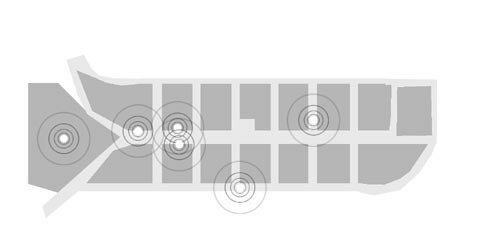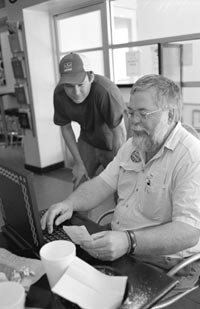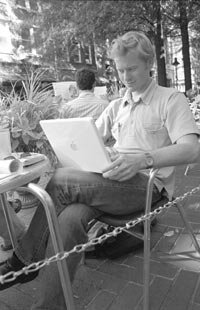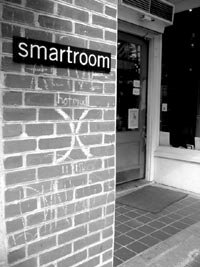>> Back to The HooK front page
COVER STORY- Airborne: wardrivers find free internet
Published October 7, 2004, in issue 0340 of the Hook

BY VIJITH ASSAR
PHOTOS BY JEN FARIELLO
Philadelphia mayor John F. Street is either completely out of his mind or a visionary who is completely out of his mind.
The self-professed quasi-geek, who always carries a state-of-the-art PDA, recently outlined a plan to outfit the City of Brotherly Love with free or low-cost wireless Internet via a single massive network covering the city's entire 135 square miles. Chief Information Officer Dianah Neff estimates that it will cost the city $10 million in startup capital and about $1.5 million in annual maintenance expenditures for each year thereafter.
The explosive proliferation of cell phones around the turn of the millennium revealed the massive untapped market for consumer-grade wireless technology in Virginia as well. Already, several downtown business use wireless networks for their own administrative needs, and a few of them will even give or rent this "Wi-Fi," as it's called, to their patrons.
Wi-Fi is great for businesses, but many of the nomadic users are simply out to enjoy themselves. "I have no business," says 23-year-old Andrew Sarner from behind his gleaming white Mac laptop. "It's all fun... and free."
Sarner lives close enough to the Downtown Mall that he doesn't see a need to bother with an ISP at home. Whenever the urge strikes, he just waltzes on over to the Mall and sets up shop.
"Pretty much every day we get somebody in here using it," says Andrew Vaughan, owner of Atomic Burrito, who considers his industrial-strength wireless router as much a part of his bistro's hip aesthetic as the sleek furniture and chrome. Likewise, the Omni hotel began providing wireless Internet to its patrons about six months ago -- with an expansive hardware setup that projects all the way past Central Place.
Wi-Fi is everywhere-- even in desktop computers. The Mac-happy Gravity Lounge-- whose very name signals its willingness to have people linger-- uses an Airport brand Wi-Fi device, despite being just a floppy disk's roll down the First Street from the waning Omni signal.
Gravity even uses wireless Internet for the heavy iMacs permanently stationed at the front of the shop. USB-driven transmitters allow cord-loathing network administrators to ditch the familiar Category-5 Ethernet cable that's undoubtedly kinked into hopeless tangles throughout countless UVA dorms.
Between the Omni and Gravity, the Mudhouse provides Internet to customers for $2.95 an hour.
These businesses may know what they're doing, but glibly providing Wi-Fi can bring a few problems. Because access points typically broadcast identification information at 100-millisecond intervals for the benefit of any devices that are using the network legally, it's all too easy to exploit this data for nefarious purposes.
Exposing these weaknesses even has its own name: "Wardriving."
"At last count there were 60 insecure networks on the Downtown Mall," says Baylor Fooks of Blue Ridge Internetworks, a downtown IT firm. "Every block you walk, you'll see five or six more."
In and of itself, there's nothing malicious about wardriving. All the equipment, including the wireless access point, is behaving properly, and wardrivers are simply taking an accounting of the bits and bytes whizzing past their heads.
The suspicious name is just an uninspired evolution of "wardialing," which comes from the 1980s cheeseball geek-chic film War Games, in which a teenager dialing random numbers with his 2400-band modem-- trying to find pirated games-- hacks into a Department of Defense computer and nearly sparks a nuclear disaster.
There are innumerable derivatives: "warcabbing," "warbicycling"-- even "warpogoing," which refers to the practice of carrying a wireless device running a "stumbling" application (such as NetStumbler or Kismet) in an attempt to catch the flying data packets.
Many wardrivers merely see their nerdy pastime as a grassroots way of keeping track of a burgeoning new technology-- and from the look of things around Water Street, they might be on to something. Unfortunately, once identified, an access point is open to attack by anybody who gets close enough.
"Despite all the press about it, the overall percentage of unencrypted networks is still about 80 percent, and companies still make the news for exposing personal data over insecure networks," says Kismet developer Mike Kershaw in an interview last month with HERT.com, a website focusing on hacker defense.
All this says nothing of the myriad private Wi-Fi users tucked away in labyrinthine offices and apartments above the ground-level commercial spaces.
Even with most users' technological naivety, not all of these networks are readily available to digital nomads. For starters, Fooks and his comrades went on a scavenger hunt armed with an Air Magnet, a sensitive device designed specifically to detect wireless Internet access points and then tune the hardware for optimum performance.
It's the Wi-Fi equivalent of a sophisticated x-ray device. The most popular stumbling applications are more like rented metal detectors, and the Windows XP Internet connection wizard on which most people rely is about as useful as a bucket and a pail on a beachfront treasure hunt.
"When somebody chooses not to broadcast the [network name], the software that comes with Windows XP doesn't see the network," explains Fooks. "That's a very small security measure. It doesn't make the network any more secure, it just makes it a little harder to locate.
"However, NetStumbler, Airsnort, and the best of the applications designed to probe the wireless networks can detect them," he cautions.
Unauthorized access and malice do not necessarily go hand in hand, though. Fooks suggests that well-meaning guest users could cripple a business simply by logging on without updating their anti-virus protection. He also cites a string of cases in which four or five Wi-Fi-happy Charlottesville businesses housed in the same building unintentionally purchased identical hardware and promptly experienced an organizational train wreck.
Wireless access points-- and the practice of mooching them-- are even seeping into residential environments. One local man was contemplating signing up for Adelphia broadband-- until the day he moved into his apartment near UVA.
"What a beautiful feeling it was," says this man, who we'll call Deep Throat. "I turned on my computer and found I had four choices of free Internet. My neighbors had spread the love."
It's not just for Hotmail and porn, though, despite Deep Throat's particular affinities.
According to Fooks, "If the coffee shop's cash register is on the same network you're on, you can access their point of sale application and credit your credit card a couple hundred thousand dollars."
Are you worried yet?
Informed that his wireless network extends past the Central Place fountain on the Downtown Mall, Antonio Jorge Jr., owner of Café Cubano in York Place, says, "Awesome. That's pretty strong."
However, after being briefed on the practice of wardriving and the risks of insecure Internet, Jorge sang a different tune. "It does concern me," he said. "That service is for the patrons of Café Cubano. I don't want to be the place where the incident actually occurs."
Still, he doesn't jump into action immediately. "I do keep my wireless on all the time," he says. "I know it's a security risk, but once I have a line to where it's working well, I prefer not to mess with it."
Mukib Rahman, director of operations at the Omni, is also somewhat concerned that his signal leaks about three blocks from the hotel.
"It hasn't caused any major problems," says Rahman. "This is the first time that it's been raised. Now that you've mentioned it, we'll definitely review it."
According to Rahman, Omni employees routinely conduct business using the same network which the hotel provides to its customers and-- heretofore unbeknownst to management-- to anyone else on the western half of the Downtown Mall.
Nervousness is likely tempered with enthusiasm, though, since practically anybody can get excited about the possibilities afforded by a constant, reliable, free, mobile Internet connection.
"I'm all for universal wireless. I think it's long overdue," says Rapture manager Mike Rodi, who relies on wireless Internet technology for everything from the network within his walls, to the broadband connection to his service provider, and even his telephone line, which utilizes a cutting-edge voice-over-Internet service. He even goes so far as to accept freeloading with a shrug and a smile.
"I'm fine with that," he says. "Obviously, we're primarily trying to provide a service for our customers, but even so, if someone comes walking along and needs to use the bathroom or whatever, I'm not going to send them away because they're not ordering food. It's the same thing."
Even Atomic Burrito is letting the freeloaders in. Vaughn is rescinding the current requirement that Wi-Fi users first obtain an access code from an employee. "We're free, which is where I think this trend is going to have to go," Vaughan says.
The fourth annual World Wide Wardrive, which wrapped up in mid-June, included thorough reviews of many areas of the United States along with less-developed explorations of Canada, Mexico, the UK, and parts of South America.
No wardriving reports were submitted for Charlottesville, but considering the attention paid to Richmond and the DC metro area, it's only a matter of time before the digital Achilles heels of many Charlottesville businesses are available online.
Wigle.net even provides a searchable visual index of wireless access points, plotted on a map of the entire world, much like Yahoo's famed-- and, comparably benign-- Mapquest service. So far, activity is limited mainly to North America, Europe, and Japan, and zooming in on our neck of the woods doesn't reveal any access points.
They're out there, though, as any techno-savvy downtowner well knows, and all it will take is one particularly motivated PDA-wielding cyberpunk to add the likes of the Mudhouse and the Omni to the International Directory of Potential Hacker Targets.
With all that in mind, the Hook set off an afternoon-long warloiter of the Downtown Mall. Some of these wireless access points aren't always available for digital hitchhiking, and some signals are considerably stronger than others.
By raising the issue, the Hook runs the risk of inadvertently closing down some of Charlottesville's favorite free Internet hot spots. On the other hand, some venue may be delighted to have a chance to help nurture a small-scale technological revolution.
Printed alongside this story are some of the best places to score free wireless Internet. Business owners, for the time being, we promise not to post the results on the Internet anywhere outside the Hook's humble website, which is hardly a prime hacker destination.
But consider this your final warning.

It's all fun... and free," says Andrew Sarner
Venue: Outside at Miller's
Service provider: nTelos
Signal strength: Excellent
Drink of choice: Spanish Peak Honey Raspberry Ale, $3.75
Venue: Anywhere near the Marco and Luca noodle shop
Service provider: Café Cubano
Signal strength: Very good
Drink of choice: Lemonade from Christian's, $1.25
Venue: The curb across from the Paramount Theater renovation project
Service provider: some "übergeeks"
Signal strength: Low
Drink of choice: Bottle of Chateau Cos-d'Estournel St. Estephe from Fleurie, $168
Venue: In the scrappy bushes outside the Visitor's Center
Service provider: Unknown
Signal strength: Good
Drink of choice: Iced Tea from Baggby's, $1.09
Venue: Outside at the Mudhouse, which provides Internet to customers for $2.95 an hour
Service provider: The Omni, which provides Internet "to customers" for free
Signal strength: Good
Drink of choice: Monkey Frozen Explosion, $3.95

Andrew Vaughan, owner of Atomic Burrito, gives Bud Branch the secret code-- but Vaughan may soon unlock the whole system.

Antonio Jorge Jr., owner of Café Cubano in York Place, is impressed by his own signal strength.
Photo by Jen Fariello
#
COVER SIDEBAR- How to stay safe
Published October 7, 2004 in issue 0340 of the Hook
So how do you keep your wireless network from getting hacked?
"You know the stuff that you just bought?" says tech expert Baylor Fooks. "You have to configure it; you can't just unwrap it."
Many offices use consumer-grade products, and not all network administrators have taken the time to configure their wireless hardware, and have not grasped that their ISP-- along with any files shared over the network-- is freely available to any strangers milling about below.
How to tell when you've stumbled upon an unconfigured network?
"If the name is 'Linksys' or 'Netgear' or 'Apple,' you know that it's a factory default situation," says Fooks, whose firm advocates the use of business-class hardware and the creation of isolated virtual local area networks, or VLANS.
Right-o!

It's all fun... and free," says Andrew Sarner
#
COVER SIDEBAR- How big is too big
Published October 7, 2004 in issue 0340 of the Hook
Think Philadelphia is the big wireless hot spot? Think again. In one of the more bizarre applications of the technology, the Columbia Rural Energy Association has constructed a 1,500-square-mile network in Walla Walla, Washington.
That's larger than the state of Rhode Island and about a dozen times larger than the proposed Philadelphia project-- and it's in the middle of a wheat field, used by farmers to monitor robot irrigation equipment.
While it's not yet apparent where this trend might lead, it's clear that "wired" as an adjective, a mid-'90s favorite, is no longer indicative of the state of the art.
#
COVER SIDEBAR- Warchalking
Published October 7, 2004 in issue 0340 of the Hook
Not all of the "wardriving" spin-offs are meaningless variations reflecting the perpetrator's preferred mode of transportation.
"It's cute," tech expert Baylor Fooks says of "warchalking," which he describes as "someone who finds a free wireless network or successfully breaks into a wireless network making a symbol on the side of the building that tells other people in this 'fraternity' where they can get free wireless."
The hieroglyphic-like symbols used by the (likely bespectacled) graffiti artists are similar to those used by Depression-era homeless people: "the same as hobos used to indicate where you can get a good meal or a warm place to sleep," Fooks says.
Different parts of the symbols can be modified to communicate different features of the connection-- bandwidth and signal strength, for example.
"Some businesses have used it creatively," Fooks says, "like the Mudhouse has warchalked itself to indicate that it has a wireless network."

PHOTO BY JEN FARIELLO
#
>> Back to The HooK front page
|